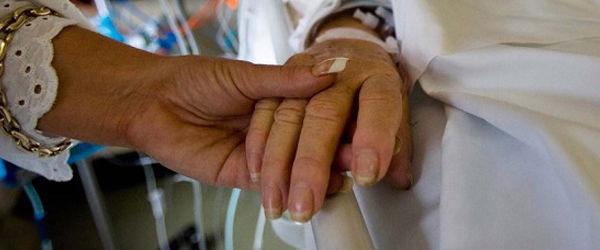Although there are no specifically Catholic issues under consideration when the U.S. Supreme Court hears oral arguments March 26-28 on various aspects of the Patient Protection and Affordable Care Act, Catholics will play some key roles.With six of the nine current Supreme Court justices being Catholics, it is almost inevitable that a Catholic justice will be a "swing vote" determining the outcome in at least one of the cases. And Catholic groups and individuals have not been shy about filing friend-of-the-court briefs seeking to sway the justices toward their hoped-for outcome.
The lawsuits before the court have nothing to do with the contraceptive mandate set by the Department of Health and Human Services --- and the First Amendment religious freedom questions raised by it --- which has been the subject of a number of other suits in lower courts.
There are four questions before the high court in three cases, with five-and-a-half hours of arguments scheduled over the three days:
--- Does the Anti-Injunction Act, which says no tax can be challenged in court before it is due, preclude a challenge to the Affordable Care Act until after the individual mandate takes effect in 2014? (Florida v. Department of Health and Human Services, one hour, March 26.)
--- Does Congress have the power to require Americans to buy health insurance ("the minimum coverage provision," also called the individual mandate)? (Department of Health and Human Services v. Florida, two hours, March 27.)
--- If the individual mandate is overturned as unconstitutional, can other parts of the Affordable Care Act remain in effect? (National Federation of Independent Business v. Sebelius and Florida v. Department of Health and Human Services, 90 minutes, March 28.)
--- Can Congress require the states to expand their Medicaid programs for those with low incomes and the disabled? (Florida v. Department of Health and Human Services, one hour, March 28.)
Dozens of organizations and individuals have filed friend-of-the-court briefs in the cases, including a number of Catholics.
The heads of 19 U.S. Catholic religious orders joined with the Leadership Conference of Women Religious and the national Catholic social justice lobby Network in a brief supporting the Medicaid expansion, calling it "a moral imperative that all levels of government institute programs that ensure the poor receive" adequate health care.
The nuns --- many of whose congregations serve in health care ministries --- said they "have witnessed firsthand ... the devastating impact of the lack of affordable health insurance and health care on women, children and other vulnerable members of society."
In a separate brief, an interfaith coalition called Faithful Reform in Health Care said the Medicaid expansion is both "morally proper and legally permissible."
"Because states can opt out of Medicaid, the only compulsion they face is the knowledge that the Medicaid expansion is the right and moral thing to do," it added.
The coalition, made up of Muslim, Jewish and Christian organizations, including many Catholic religious congregations, said the scriptures of the three Abrahamic religions and the sacred teachings of other faiths "understand that addressing the general welfare of the nation includes giving particular attention to the poor and the sick."
"Individual acts of kindness to persons suffering ill health are commendable, but they cannot replace a nationwide safety-net program like Medicaid, which currently serves millions of this nation's poor and vulnerable," the brief said.
Other Catholic groups argued against the Affordable Care Act, however, in briefs urging that the individual mandate be declared unconstitutional.
The Catholic Medical Association joined five other national organizations in saying that the requirement that every American purchase health insurance or face a penalty "effectively imposes an 'abortion premium mandate' that violates the Free Exercise Clause of the First Amendment."
Even if those who have religious or moral objections to abortion are able to find health insurance that excludes abortion, they "have their marketplace choices impermissibly limited under the (Affordable Care) Act by being forced to choose between insufficient plans that respect their conscience versus other plans that happen to require an abortion premium, but that may otherwise better meet their health needs or their choice of doctor network," the brief said.
A brief filed by CatholicVote.org, which describes itself as a nonpartisan voter education project that promotes "an authentic understanding of ordered liberty and the common good" based on Catholic teaching, took a different tack in opposing the health reform law.
"Committed to individual liberty, minimal government, federalism and the doctrine of subsidiarity, CatholicVote.org believes that the Patient Protection and Affordable Care Act is a pernicious expansion of federal power that undermines religious liberty and responsibility, diminishes the sphere of private charitable activity and arrogates to the federal government totalitarian control of a vitally important and deeply personal matter," it said.
The New Jersey-based American Catholic Lawyers Association based its opposition to the individual mandate on the principle of federalism.
"Forcing a person into a market --- dragging that person, kicking and screaming, into a sphere of activity in which he or she has and wants no involvement whatever --- contradicts utterly the deeply embedded tradition of individual autonomy and self-determination which is a hallmark of our nation," the association's brief said.
---CNS
{gallery width=100 height=100}gallery/2012/0323/courthealth/{/gallery}

